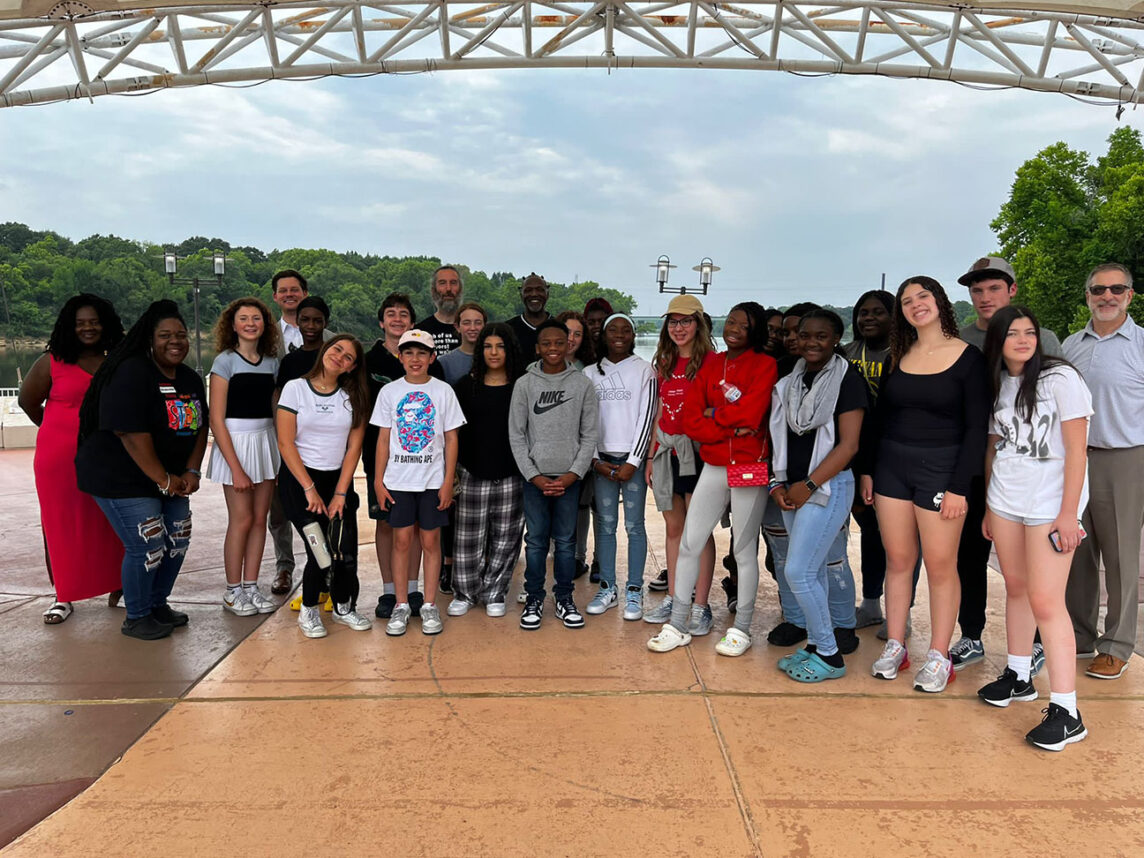When Kenny Stoff’s son, a student at Pressman Academy, went on a class trip to Alabama, he decided to join him. Kenny also brought along a team of cameramen to document the experience.
This was no ordinary field trip; eighth-grade students traveled to Selma, Alabama, to meet with their peers at RB Hudson School, which they had been communicating with via Zoom for a year.
The school collaboration, initiated by a private Jewish day school, aimed to build understanding and tolerance among students from different backgrounds. Until May 2023, RB Hudson students had never met Jews, and Pressman students had no opportunity to interact with Black peers. Rabbi Chaim Tureff of Pressman Academy believed that this initiative was a way to combat racism and anti-Semitism while promoting tolerance.
“It really opened the minds of our students,” Tureff said. “Generally speaking, we tend to communicate and spend time with people who are similar to us. This experience allowed them to connect with people from different parts of the country, as well as from different religious, ethnic, racial and socioeconomic backgrounds. It broadened their worldview.”
Thirteen Pressman Academy students took part in the project and met with 10 Hudson students during several Zoom sessions before their personal visit. Kenny, a videographer known for his work on music films featuring the Foo Fighters, Karol G and Coachella, shot dozens of hours of footage resulting in a compelling 45-minute documentary titled “Community Together: Reinventing a New Tomorrow.” The film screening will take place on Sunday, November 3 at 6:00 p.m. at the Museum of Tolerance
“The documentary provides a powerful insight into our common humanity and the connections that bind us,” reads the film’s blurb. “Bringing together African-American students from Selma and Jewish American students from Los Angeles, the film explores the U.S. civil rights movement and the bonds between these two communities. Explores the history of racism and its lasting effects today.”
Miya Peterseil, one of the students on the trip, shared how it positively impacted her life. “I was able to experience a completely different culture and connect with people I would never have met otherwise,” she said.
“I was able to experience a completely different culture and connect with people I would never have met otherwise.”
– Miya Peterseil
However, the cost of travel and lack of funds made it difficult for Alabama students to visit Los Angeles. Tureff noted that they plan to continue the program by meeting on Zoom once a month. Then, eighth-grade students will travel to Alabama as part of the annual trip to Selma.
“My goal is for the film to be part of a broader effort to help schools find ways to educate students,” Tureff said. “They can collaborate with different institutions and use the film as a starting point.”
But can relationships between students from very different backgrounds, ethnicities and faiths really last? Peterseil admitted that it was difficult to maintain contact after the first meeting.
“However, since the release of the documentary, we have discussed our thoughts on the matter and are considering meeting again in the future,” she said.
Another student, Adira Lee, said participating in the program was a life-changing experience, “especially after growing up in my little Jewish bubble. It opened up a lot of new doors and ideas for me and made me think about things I had never thought about before.”
She added: “One realization that continues to resonate with me is that while both the black and Jewish communities have faced oppression, to the outside world we often appear to be just white people. Our Jewish identity is not always visible, while theirs is.”
Kenny, who had two sons at Pressman — and now sends his daughter there, too — premiered the film for the first time at the R.B. Hudson School for eighth-graders. “The three students featured in the film, who are currently in high school, were also present at the screening,” he said. “I looked at their faces and saw how emotional they were. This had a significant impact on them. These are 14-year-olds who have an attention span of a minute or less, and yet they were engaged and didn’t fall asleep. It was amazing to see.”

The director created documentaries before moving on to live music videos. He said the purpose of the film was to show children that even though they come from very different backgrounds, they have a lot in common.
“The discussion after the screening was great. They realized that their preconceived notions about the Jewish and African American communities were wrong. Friendships and bonds were quickly formed. And really, the goal of this video is to start a conversation; “is a screen for a broader conversation about black-Jewish relations, civil rights, racism and anti-Semitism.”
The second show was held in Montgomery in cooperation with the Jewish Federation. “People have been touched in a significant way,” Kenny said. “They cried, laughed and wanted to talk about it later. As a filmmaker, that’s what you want: reaction and engagement.”
On November 3, there will be a free screening at the Pressman Academy and the Museum of Tolerance. After the screening, there will be a panel discussion. Participants are encouraged to submit their responses on the Museum of Tolerance website.
Leave a Reply